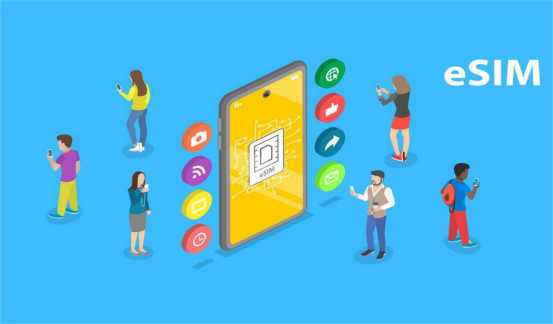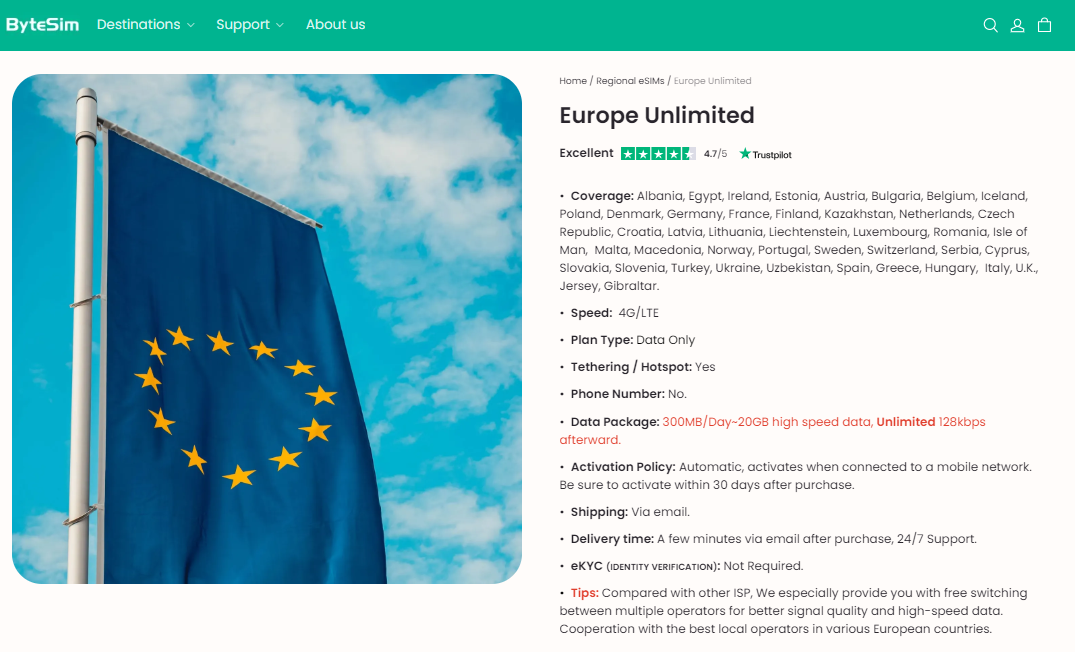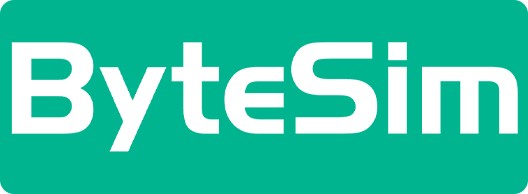The Best eSIM for Europe Travel: A Comprehensive Guide to Seamless Connectivity
Dec 26,2023 | James
In the quest for high-speed mobile data during European travels, the traditional choice has often been a physical SIM card. However, the landscape is changing with newer smartphones incorporating an embedded electronic SIM, or eSIM. This advanced feature allows users to connect effortlessly to European mobile carriers without the hassle of dealing with a physical SIM card. While eSIM data plans bring undeniable convenience to the table, there are intricacies to navigate. This article will unravel the details of eSIM data plans in Europe, offering insights and practical tips to help you discover the best eSIM solution for an enhanced travel experience.

Understanding the Basics of eSIMs
Before delving into the best eSIM options for Europe travel, let's understand the basics of eSIM technology. Unlike traditional physical SIM cards that you insert into your device, eSIMs are built into the device itself. They are programmable and can be remotely activated to connect to a mobile network, eliminating the need for a physical card swap.
One of the key advantages of eSIMs is their convenience, especially for frequent travelers. No more fumbling with tiny SIM cards or worrying about misplacing them — eSIMs streamline the process and make it easier to switch between carriers. This is particularly beneficial when exploring multiple countries within Europe, each with its own set of mobile carriers and plans.
Benefits of Choosing eSIMs for Europe Travel
-
Flexibility Across Borders
One of the standout features of eSIMs is their ability to seamlessly switch between different carriers and plans. This flexibility is invaluable when traveling through Europe, where each country may have its preferred carriers. With an eSIM, you can switch providers without the need for a physical SIM card, ensuring that you stay connected regardless of your location.
-
Remote Activation
Unlike traditional SIM cards that require a visit to a local store for activation, eSIMs can be activated remotely. This means you can set up your data plan before even stepping foot in Europe, ensuring that you have connectivity the moment you arrive. This remote activation feature can be a time-saver and a stress-reliever for travelers.
-
Space-Saving Convenience
eSIMs eliminate the need for a physical card slot, allowing for more streamlined and sleek device designs. For travelers who prefer lighter luggage and compact devices, the space-saving convenience of eSIMs is a notable advantage.
Tips for Finding the Best eSIM for Europe Travel
Now that we've covered the benefits of eSIMs, let's explore some essential tips for finding the best eSIM for your Europe travel:
-
Research Carrier Coverage
Before selecting an eSIM provider, research the coverage of different carriers in the specific European countries you plan to visit. Coverage can vary, and opting for a carrier with a robust network in your desired destinations ensures a more reliable connection.
-
Consider Data Packages
Evaluate your data needs and select an eSIM provider offering suitable data packages. Whether you're a casual user who checks emails occasionally or a digital nomad relying on constant connectivity, choosing a plan that aligns with your usage is key to cost-effectiveness.
Ensure that your device supports eSIM technology. While an increasing number of smartphones and other devices come equipped with eSIM capabilities, it's always prudent to double-check compatibility to avoid any surprises.
-
Compare Pricing Structures
Different eSIM providers may have varied pricing structures, including pay-as-you-go options, monthly plans, or prepaid packages. Compare these structures to find the one that best suits your budget and usage patterns.
-
Read User Reviews
Explore user reviews and testimonials for different eSIM providers. Real-world experiences can offer valuable insights into the reliability, customer service, and overall satisfaction of each provider.
-
Check for Roaming Options
If your travels involve crossing multiple European borders, consider eSIM providers that offer favorable roaming options. This ensures continuous connectivity without incurring exorbitant fees as you move from one country to another.
Best eSIM for Europe Travel

Kind of daunted by this long tip list? Fret not; here are some of the best eSIM providers for Europe travel. You can directly choose one of them below or search alternatives online.
Airalo
Airalo specializes in global eSIM solutions and offers affordable plans for European travel. Their pay-as-you-go model allows flexibility, making it suitable for those who prefer not to commit to a long-term plan.
Truphone
Truphone offers comprehensive eSIM plans with excellent coverage across various European countries. Their data packages cater to different needs, making it a versatile choice for travelers with varying usage patterns.
Ubigi
Ubigi provides convenient eSIM solutions for Europe travel, allowing users to choose from different data plans based on their preferences. With straightforward activation processes, Ubigi ensures a hassle-free experience for users.
GigSky
GigSky is known for its global eSIM coverage, and their plans are well-suited for European travel. With options for short-term and long-term usage, GigSky caters to the diverse needs of travelers.
ByteSim
ByteSim is committed to providing comprehensive solutions for cross-border travel communication needs. Currently, ByteSim eSIM cards have covered more than 200 countries and regions around the world, including Greater China, Japan, Korea, Singapore, Malaysia, Thailand, and the United States and Canada, and have covered major popular travel destinations around the world.
How Much eSIM Costs for Europe Travel
The charging mechanisms employed by eSIM providers are diverse and contingent on several factors, including the provider's business model, the chosen plan or package, and the specific terms and conditions of the service. This variety is advantageous for users, as it allows them to select an eSIM plan that aligns with their individual preferences, usage patterns, and budgetary considerations.
Presented below is a streamlined chart that compares the charges of various eSIM providers. You can use it as a point of reference.
|
Providers
|
Data Plan
|
Validity
|
Price
|
Coverage
|
|
Airalo
|
3GB
|
30days
|
US $13.00
|
39 countries in Europe
|
|
Truphone
|
2GB
|
30days
|
US $30.00
|
113 countries worldwide
|
|
Ubigi
|
3GB
|
30days
|
US $6.00
|
France only
|
|
GigSky
|
5GB
|
30days
|
US $19.99
|
43 countries in Europe
|
|
ByteSim
|
5GB
|
30days
|
US $11.00
|
35 countries in Europe
|
In this dynamic landscape of eSIM providers for European travel, ByteSim distinguishes itself with a competitive 5GB data plan priced at US $11.00, encompassing a wide network across 35 European countries. Our offering strikes a harmonious balance between affordability and expansive coverage, positioning ByteSim as a compelling option for discerning travelers.

As travelers compare options, the modest pricing and robust data allocation of ByteSim provide a noteworthy alternative. Alongside esteemed competitors like Airalo, Truphone, Ubigi, and GigSky, ByteSim stands out for delivering cost-effective connectivity without compromising on reach. While other providers offer varying data plans, ByteSim's commitment to reliability and cost-effectiveness ensures that users experience seamless connectivity throughout their European journeys. As you navigate the diverse eSIM landscape, ByteSim remains a pragmatic choice, marrying affordability with extensive coverage for a hassle-free and efficient travel experience. If you want more details of ByteSim eSIM, please visit our website to choose your preferred plan.
Activating eSIM for Europe Travel
Activating an eSIM card for Europe involves a straightforward process, typically done through your device's settings. Here's a general guide:
-
Ensure Device Compatibility:
Confirm that your device supports eSIM technology. Most modern smartphones and some smartwatches are equipped with eSIM capabilities.
-
Obtain eSIM Information:
If you haven't already, acquire the eSIM card or QR code from your chosen eSIM provider. This may be sent digitally or provided physically, depending on the provider.
-
Access Device Settings:
Open the settings menu on your device. Look for the section related to cellular or mobile network settings.
-
Locate eSIM Settings:
Within the cellular or mobile network settings, find the eSIM or SIM card management section. This is where you'll initiate the activation process.
-
Add eSIM:
Choose the option to add or set up an eSIM. Your device will prompt you to scan the QR code or manually enter the details provided by your eSIM provider.
-
Scan QR Code or Enter Details:
If using a QR code, position your device's camera to scan the code. Alternatively, enter the required details manually, including the eSIM's activation code and any other information provided by your eSIM provider.
-
Confirm Activation:
Follow the on-screen prompts to confirm and activate the eSIM. This may involve accepting terms and conditions, confirming the selected data plan, and verifying your identity.
-
Restart Device:
After activation, restart your device to apply the changes. This step ensures that the eSIM is fully integrated into your device's network settings.
-
Test Connectivity:
Once the device restarts, check for network connectivity. Ensure that the eSIM is recognized, and you have access to mobile data.
-
Contact Customer Support (if needed):
If you encounter any issues during the activation process, reach out to the customer support of your eSIM provider. They can provide assistance and troubleshoot any activation-related issues.
It's important to note that the specific steps may vary slightly depending on your device and eSIM provider. Always refer to the instructions provided by your eSIM provider for the most accurate and up-to-date information on activating your eSIM for Europe travel.
Conclusion
In conclusion, eSIMs have revolutionized the way we stay connected while traveling, offering a convenient and flexible solution for Europe-bound adventurers. By understanding the basics of eSIM technology and following the tips outlined in this article, you can make an informed decision when choosing the best eSIM for your European travels. Explore the top providers, consider your data needs, and embark on your journey with the confidence of seamless connectivity across borders. Safe travels!



